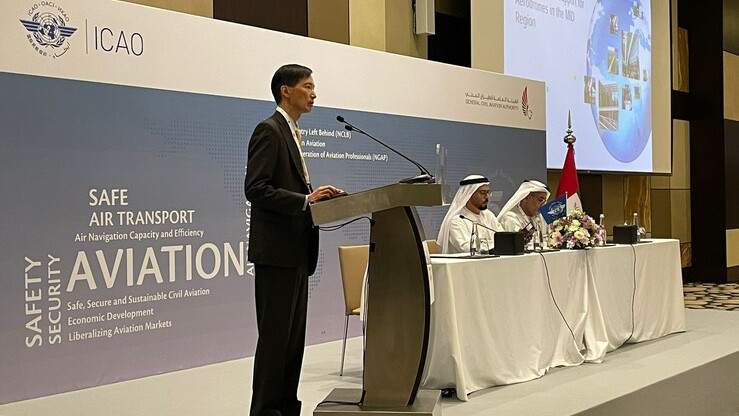ACI Asia-Pacific presented a policy paper on decarbonization at the 6th ICAO Conference for the Director General of Civil Aviation (DGCA) for the Middle East in Abu Dhabi, calling for improved government support for airports to achieve net-zero carbon emission goals.
Acknowledging the suggestions made by ACI Asia-Pacific, the conference urged airport operators in the Middle East to implement the Airport Carbon Accreditation Programme (ACA) and adopt in their decarbonization strategy the Airport Carbon and Emissions Reporting Tool (ACERT), which helps airport operators to calculate their own greenhouse gas emissions. Moreover, ACI Asia-Pacific encouraged airports to share best practices and learn from others through its Green Airports Recognition program.
Moreover, the conference encouraged airport operators to implement decarbonization strategies, including decarbonizing electricity grids, facilitating the switch to renewable energy at airports, and incorporating emissions-saving initiatives into in their action plans.
Additionally, based on ACI Asia-Pacific’s recommendations, the conference supported the adoption of One-Stop Security (OSS) in the Middle East. Furthermore, the conference also agreed to encourage states in the Middle East to include ACI World’s Airport Excellence Program (APEX) in Safety in their National Aviation Safety Plans as a tool to promote aerodrome certification. The program is a peer assessment program where aerodrome safety and operations professionals are invited voluntarily to conduct safety reviews of airports. The reviews have proved helpful for airports to improve safety compliance.
The conference accepted ACI Asia-Pacific’s suggestions in the principles and objectives for drafting the MID-Air Transport Strategic Plan 2025-2040 and appointed ACI Asia-Pacific as the co-rapporteur of the working group tasked to draft the plan. The plan will define the strategic objectives for the air transportation industry of the Middle East in the areas of safety, security, facilitation, environmental protection and air connectivity.
In achieving these objectives, the plan will be aimed at providing the Middle East population with better access to air transportation, with due consideration of economic, social and environmental developments in support of the United Nations Sustainable Development Goals and ICAO Strategic Objectives.
Stefano Baronci, director general of ACI Asia-Pacific said, “We would like to express our gratitude to the Middle Eastern governments for the support they provided the aviation industry during this pandemic. The global agreement for aviation to achieve net-zero carbon emissions by 2050 requires the same level of support from governments to incentivize airports and implement plans in partnership to reach net-zero goals. To this end, the aviation ecosystem, as a whole, including governments, airports, airlines and others, must work together.”
“It is encouraging to see airports in the region pursuing net-zero targets as they explore potential pathways. There are already 12 airports from the Middle East in Airport Carbon Accreditation program, recognized at different levels. With over 100 airports in Middle East, we would like to see more airports participating in the ACI ACA program. Our Airport Carbon Accreditation Mentorship program is another tool for airports starting their decarbonization journey.”

